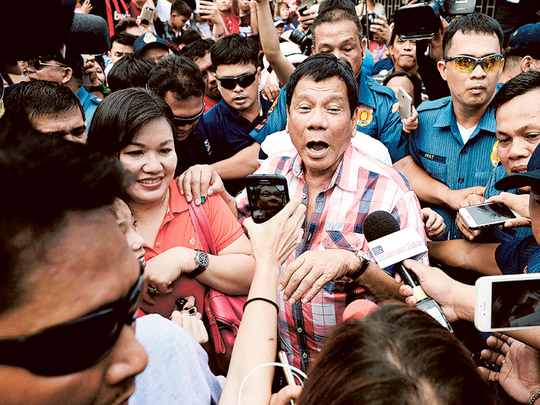
Manila: Senior allies of president-elect Rodrigo Duterte vowed to work quicker and harder to achieve promises that the outgoing mayor of Davao City in southern Mindanao made during a three month campaign ahead of the May 9 polls.
The synergy is strong because Duterte’s allies are proud that one of their own is helming affairs at the top, said political analyst Prospero de Vera, adding, “Finally somebody from Mindanao has taken out the Mindanao curse. What makes Duterte phenomenal is he won Metro Manila, the seat of imperial Manila which everyone in Mindanao hates. That’s historic in a sense.”
“I remember in December, during lunch with former senate president Nene Pimentel and his wife Bing, I was amazed at their belief in Duterte. They said, ‘Duterte has to win.’ At the time, it was the Mindanaoans with conviction to correct the historical injustice to Mindanao who really believed that he could win,” de Vera narrated.
“He is both a Visayan and a Mindanaoan leader,” said political analyst Edmund Tayao, adding the ethnic residents in central and southern Philippines who voted for Duterte were expected to actively participate in governance.
“He will get a lot of people from Mindanao because he is from there,” explained sociologist Randy David.
Describing Duterte’s political allies now, spokesman Peter Laviña said, “Many of us were activist fighting for our principles and for genuine change. People like us have shared values and vision with President Duterte — to serve our country and our people.” A foreign affairs consultant and a businessman, Laviña was an activist when Duterte was government prosecutor in Davao. He was also an ex-journalist.
Leoncio “Jun” Evasco, mayor of Mariboc town and Duterte’s national campaign manager, was a rebel priest who was prosecuted by Duterte in the past.
Another political ally, Christopher “Bong” Go, was Duterte’s chief assistant when the latter was congressman at the House of Representatives in 1998 and currently at Davao City’s mayor’s office since 2001.
Jesus Dureza, former peace negotiator of ex-president Fidel Ramos (1992-1998) is a prospective cabinet member.
Marco Polo Hotel owner and businessman Carlos Dominguez, finance manager during the campaign period, and Duterte’s grade school classmate at the Ateneo de Davao, is being eyed as finance or transportation secretary.
Congressman Pantaleon Alvarez of the Philippine Democratic Party’s-People’s Power (PDP-Laban), which launched Duterte’s candidacy, is being groomed as the next House Speaker to push Duterte’s legislative agenda. The pro-Duterte senate president was not yet named.
Allies have drafted Duterte’s four committees that include transition committee; inauguration committee for simple rites for the incoming president on June 30; selection committee for appointment of cabinet members; and policy committee for immediate actions in the next three to six months of Duterte’s administration.
Philippine economy has grown strongest in Southeast Asia, but gains have not resulted in education, health, and social subsidies for poor people- because of corruption that has made poor people poorer, analysts said.
The country’s judicial system and security forces have failed to end the reign of criminal syndicates, drug lords, and terrorists, creating bad business environment in many regions that need development.
The government has not properly implemented two pro-autonomy peace settlements forged with a 44-year old southern-based Filipino-Muslim rebel group in 1976 and 1996, and Congress has failed to pass a proposed law to implement another pro-autonomy peace settlement reached with a 38-year old Filipino-Muslim rebel group in 2014.
The government has yet to conclude peace talks with a 44-year old Communist group that operates nationwide — despite talks that began in 1992.
The government has not implemented real economic reforms because of big businesses’ protectionist lobby. The government has also failed to invest on infrastructure to attract foreign direct investments; and on rural infrastructure to help farmers and fishermen in the provinces.











